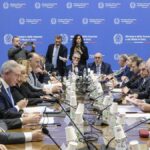NATO secretary general calls for increased military Spending: ‘The threat is moving towards Us’
credit : Shutterstock
In his first major address since taking over as NATO Secretary General, Mark Rutte has issued a stark warning: the alliance must adopt a ‘war mentality’ in response to escalating global tensions.
With Russia gearing up for a long-term conflict and China’s military growth increasing without transparency, Rutte has stressed the need for significant increases in military spending across NATO member countries.
NATO faces growing military threats
Mark Rutte, NATO’s new Secretary General, has raised the alarm over the shifting security landscape, urging NATO members to adopt a more robust defence posture. “We must shift to a war mentality,” Rutte stated, acknowledging that Russia’s military preparations and increasing collaboration between authoritarian states such as China, Russia, North Korea, and Iran signal an impending security challenge.
With Russia expected to allocate 7-8% of its GDP on defence by 2025, the current NATO target of 2% GDP spending is no longer sufficient. The reality of this looming threat demands that NATO countries rethink their defence budgets. Rutte made it clear: “We will need much more.”
Why joint procurement and smarter spending are crucial for NATO’s future
Rutte’s call to arms is not just about spending more—it’s about spending more effectively. The secretary-general emphasized the decades of underinvestment in Europe’s defence industry, which remains too small, fragmented, and slow to adequately address the emerging threats.
To address this, Rutte advocates for joint procurement at the European level, which would ensure a more efficient use of resources. “The financial impact will be enormous unless we act together,” he warned. The European Commission has already acknowledged defence investment as a priority, signalling a shift in policy to address NATO’s pressing demands.
Tensions with Trump’s approach to NATO and peace negotiations
As Donald Trump prepares for his return to the White House, speculation grows about a potential shift in U.S. policy toward Russia. Trump has previously indicated a willingness to negotiate directly with the Kremlin, which could reduce the U.S. commitment to Ukraine and NATO.
For Rutte, this raises significant concerns. He warns that engaging in negotiations without securing a strong peace deal could ultimately benefit Russia. “If Putin emerges as the winner from these talks, it will be a bad deal for Europe,“ Rutte cautioned.
Despite these uncertainties, Rutte’s position remains firm. NATO’s commitment to increased defence spending is not driven by external pressure, but by the growing need to protect its security.










